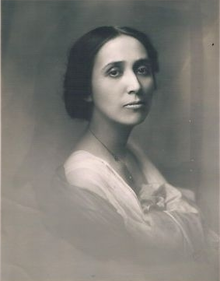Laura (Miriam) Cornelius Kellogg | |
|---|---|
 Laura Cornelius Kellogg | |
| Born | September 10, 1880[1] |
| Died | 1947 (aged 66–67) |
| Other names | Minnie Kellogg |
| Education | Barnard College, Cornell University, the New York School of Philanthropy, Stanford University, and the University of Wisconsin |
| Occupation(s) | Native American activist and poet |
Laura Cornelius Kellogg (September 10, 1880 – 1947) was an Oneida leader, author, orator, activist and visionary. Kellogg, a descendant of distinguished Oneida leaders, was a founder of the Society of American Indians. Kellogg was an advocate for the renaissance and sovereignty of the Six Nations of the Iroquois, and fought for communal tribal lands, tribal autonomy and self-government. Popularly known as "Indian Princess Wynnogene," Kellogg was the voice of the Oneidas and Haudenosaunee people in national and international forums. During the 1920s and 1930s, Kellogg and her husband, Orrin J. Kellogg, pursued land claims in New York on behalf of the Six Nations people. Kellogg's "Lolomi Plan" was a Progressive Era alternative to Bureau of Indian Affairs control emphasizing indigenous American self-sufficiency, cooperative labor and organization, and capitalization of labor.[2] According to historian Laurence Hauptman, "Kellogg helped transform the modern Iroquois, not back into their ancient League, but into major actors, activists and litigants in the modern world of the 20th century Indian politics."[3]
- ^ Hauptman, Laurence (2008). Seven Generations of Iroquois Leadership: The Six Nations Since 1800. Syracuse University Press. ISBN 9780815631651.
- ^ Hauptman, 2008, p. 153
- ^ Hauptman, 2008, p.16-163.